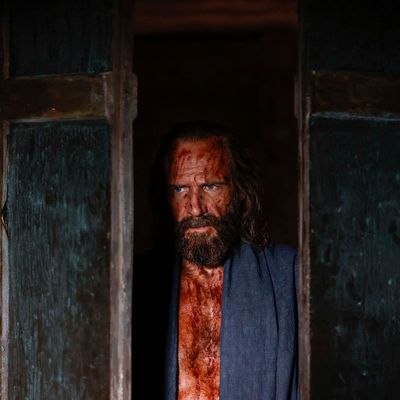
Anyone who saw Ralph Fiennes onstage in Straight Line Crazy, David Hare’s 2022 play about the career of Robert Moses, came away with the realization (or at least the reminder) that this man is one of our most physical actors. As the controversial New York bureaucrat and city planner, Fiennes strode and charged across a stage dominated by a map of the city, his body a metaphor for Moses’s ability to plow through forests and hills and villages and neighborhoods. The performance was so explosive, the actor so driven, that you wondered if at some point he might bound off the Shed’s modest proscenium and into your lap. That sounds like a joke, but it felt real at the time — and somewhat dangerous, given Fiennes’s hawkish intensity.
In Uberto Pasolini’s The Return, Fiennes plays Odysseus, the ancient Greek king of Ithaca, whose long journey home from the Trojan War was mythologized in Homer’s The Odyssey. The film presents the final section of the ancient epic: Odysseus’ arrival as a stranger in Ithaca after ten long years, and his discovery that his wife Penelope (Juliette Binoche), who’s had no news of him, is now being pursued by a small army of suitors out for his throne. Odysseus is dressed as a beggar, ragged and ruined. Nobody recognizes him, and he’s repeatedly humiliated. It’s a fine showcase for Fiennes’s physicality not just in movement but stasis as well. Odysseus famously burns with anger; Homer describes him “rolling side to side, as a cook turns a sausage, big with blood and fat, at a scorching blaze, without a pause, to broil it quick.”
I say this with nothing but admiration: Ralph Fiennes makes for a great burning sausage. He can do coiled menace and rage, but he also knows how to use his stillness. In his other big film this year, the raucously entertaining papal drama Conclave, the actor brings an anguished softness to the role of Cardinal Lawrence that speaks to the character’s honest cultivation of doubt, an effective contrast to the bulletlike schemers around him. These two seemingly passive roles demonstrate, in subtle ways, the actor’s range. Fiennes spends much of The Return wallowing in paralyzing indecision, watching and wondering and waiting, but here, his hesitancy is nothing like Conclave’s Lawrence. Because we’re aware, through the actor’s simmering body language, that revenge and slaughter are nigh — that a blowup and a bloodbath are inevitable. (That’s not a spoiler; you’ve had 2,500 years to familiarize yourself with The Odyssey.)
Gone are the story’s overt mythical elements, the gods and goddesses changing shape and toying with these mortals’ fates. (Who needs gods when you have Ralph Fiennes?) Instead, Pasolini introduces some slight modern psychology, tempering Odysseus’ rage with grief and indecision. Traumatized by the war and the toll of his journey (which saw him lose all his men), Odysseus no longer seems to recognize himself. He doesn’t know if he deserves his old life back. When he finally confronts Penelope, he can’t bring himself to reveal his identity; she doesn’t recognize him either, but their exchange suggests that maybe, on a subconscious level, she understands something deeper about this vaguely familiar figure standing before her.
If only the rest of this otherwise wan film were at Fiennes’s and Binoche’s level. I can see how Pasolini, wanting to strip the tale down to its essentials, might go for dramatic austerity. Homer’s poetry, of course, is gone, but so too is any real sense of dynamism. When people speak in The Return, they generally just stand across from each other and talk with little emotion or vitality. The director’s namesake, the legendary Pier Paolo Pasolini, also adapted some of the classics back in the 1960s and ’70s, and he too adopted an unadorned, matter-of-fact approach to retelling these tales. (The two men are not, as far as I can tell, related; Uberto, a former producer, is actually a nephew of the great Luchino Visconti!) But Pier Paolo had a painter’s eye and a poet’s sensibility; in simplicity he found his own mythic grandeur. Uberto, by contrast, finds mostly inertia — save for whenever Fiennes is onscreen, which thankfully is quite often. The Return works neither as a CliffsNotes version of The Odyssey nor as its own stand-alone tale. But it does remind us that Ralph Fiennes is an immortal.
More Movie Reviews
- The Accountant 2 Can Not Be Taken Seriously
- Another Simple Favor Is So Fun, Until It Gets So Dumb
- Errol Morris Has Been Sucked Into the Gaping Maw of True Crime


